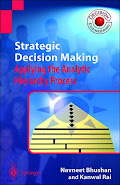Wishing Everyone a Happy New Year - 2018!
The new year starts with my paper accepted at Future of Learning Conference at IIM Bangalore
(The abstract of the paper is below)
Digital Learning
Transformation – A Strategic Framework using the Analytic Hierarchy Process
Navneet Bhushan
1B-401, Akme Harmony,Sarjapur Outer
Ring Road,
Bangalore 560103, INDIA
Abstract
We define and describe a strategic framework for digital
learning transformation using a well-established multi-criteria decision-making
(MCDM) technique – the Analytic Hierarchy Process (AHP). We classify the
digital transformation paths along 12 different dimensions of becoming,
cognifying, flowing, screening, accessing, sharing, filtering, remixing,
interacting, tracking, questioning and beginning. These dimensions are
organized as a hierarchy of digital functions after due-diligence of their
interdependence analysis using the design structure matrix (DSM). This leads to
identification of a digital learning structure amongst the 12 digital
dimensions for the specific case.
The hierarchy of digital learning dimensions is utilized for
strategic prioritization of these dimensions towards a digital learning
transformation of any traditional learning system towards an amalgamated
traditional + digital learning system in a seamless manner. The AHP method that
converts pairwise comparisons by multiple experts and stakeholders into
quantitative scores is utilized to create consensus amongst different stakeholders
who typically may have different views on taking specific paths ahead. The AHP
helps in not only checking the individual consistency of experts but also in
visualizing the process of creating consensus amongst the group.
The Digital Learning Transformation
Framework (DLTF) proposed in this paper is generalized enough to adapt to any
specific traditional learning systems to glean step-by-step roadmap for all key
digital functions chosen through the DSM in specific context. Three key
criteria of relative feasibility, learner’s value and technological enhancement
are used to rank order chosen digital functions for the particular context or
application. Three different scores are then utilized for creating a digital
strategic transformation roadmap along the chosen dimensions for the specific
case. The DLTF is generic and flexible enough to be applicable for variety of
traditional learning systems and can help in seamless transformation decisions
and execution.

